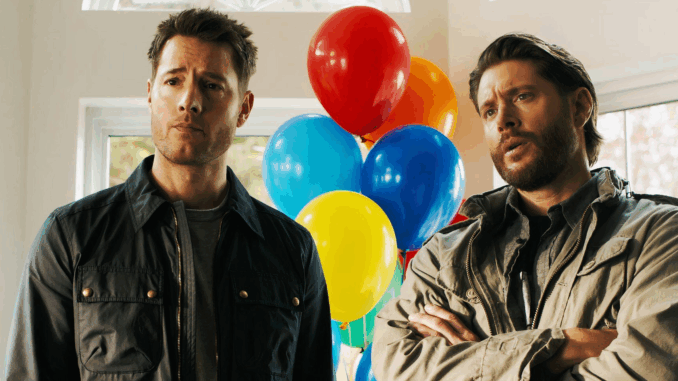
As Tracker Season 2 wrapped up, fans were left with a finale that was as emotionally charged as it was ambiguous. While the season closed several important narrative arcs, it also opened the door to major transformations in Colter Shaw’s journey — both personally and professionally. For a show that has been as much about internal evolution as external adventure, the Season 2 ending has set the stage for a darker, more complex Season 3.
Colter’s Emotional Reckoning
Throughout Season 2, Colter Shaw (Justin Hartley) continued to track missing persons across the country — but this season, the cases felt more personal, more morally murky. In the finale, he was forced to confront not only a brutal kidnapping case but also long-buried truths about his own past.
The final moments of the episode saw Colter standing in front of the ruins of the family cabin in California — a recurring symbol throughout the series. After recovering an artifact once hidden by his late father, Colter’s reaction wasn’t closure. It was uncertainty. The look on his face said it all: he didn’t feel peace, he felt more questions.
Season 2 ended with Colter realizing that the truth he’s been searching for might be less about facts and more about acceptance. It’s a powerful shift, signaling that the show could soon evolve beyond the typical “case-of-the-week” format into something much deeper.
The Disappearance of the Original Team
One of the most controversial developments in the finale was the complete absence of two key characters: Bobby Exley (Eric Graise) and Velma Bruhl (Abby McEnany). Their departure had been quietly suggested earlier in the season, but the finale confirmed that Colter is now operating almost entirely alone, with only Reenie (Fiona Rene) as his main contact.
This change left many fans disappointed. Bobby’s technical skills and Velma’s sarcastic wisdom offered balance to Colter’s intensity. Their departure makes the world of Tracker feel lonelier, colder — but that might be exactly what the show is aiming for. By stripping away the ensemble, the series may be positioning Colter as a truly solitary figure again, placing emphasis on his internal conflicts rather than external camaraderie.
The Cliffhanger: Who Was Watching?

The final scene of Season 2 introduced a mysterious figure watching Colter from a distance as he left the cabin. We never saw their face. Was it a rival bounty hunter? A government operative? Or someone connected to Colter’s family history?
This cryptic tease suggests that Season 3 could introduce a larger antagonist or a broader conspiracy. The show has previously flirted with overarching enemies, but this moment felt more intentional and threatening. It’s possible that Colter’s past — particularly the secrets surrounding his father’s paranoia — is finally catching up to him in a more tangible way.
Themes of Isolation and Identity
What made the Season 2 finale stand out wasn’t just the plot developments, but the tone. The episode leaned heavily into Colter’s emotional solitude. With fewer recurring characters and more introspective moments, Tracker seems to be shifting into a moodier, character-driven narrative.
The writing emphasized questions of identity: Is Colter just a hired tracker, or is he something more? Can he ever really find peace while constantly on the move? These aren’t new questions, but the finale brought them to the forefront, especially in a quiet monologue Colter delivered over a tape recording made by his father. That scene — raw, intimate, unresolved — encapsulated the season’s emotional weight.
What This Means for Season 3
With Season 3 already greenlit, the finale leaves plenty of room for reinvention. Here’s what we might expect:
-
New characters: With much of the original supporting cast gone, Season 3 is likely to introduce new faces — allies, clients, or enemies — that could reshape the show’s dynamics.
-
Darker storytelling: The tone of the finale suggests that the writers are willing to take Colter into more morally ambiguous territory. Expect themes like trust, betrayal, and legacy to become central.
-
A new central mystery: While each episode has featured standalone cases, the finale’s cliffhanger hints at a broader, season-long storyline that may finally tie together Colter’s fragmented past.
-
Potential return of old characters: Though Velma and Bobby are gone for now, the show could always bring them back — especially if Colter reaches a breaking point.
Final Thoughts: An Ending That’s Also a Beginning
The Season 2 finale of Tracker wasn’t flashy, but it was powerful. It offered closure in some areas while cracking open new doors in others. Most importantly, it signaled that the series is evolving.
Justin Hartley’s portrayal of Colter Shaw continues to deepen with each episode, and with the show narrowing its focus on him, we may be about to see his most compelling journey yet. The open-ended nature of the finale isn’t just a teaser — it’s an invitation to go deeper into a character whose greatest mystery may be himself.
Season 3 has the potential to be the most personal, introspective chapter yet. And if the finale is any indication, Tracker isn’t slowing down. It’s just shifting gears.
